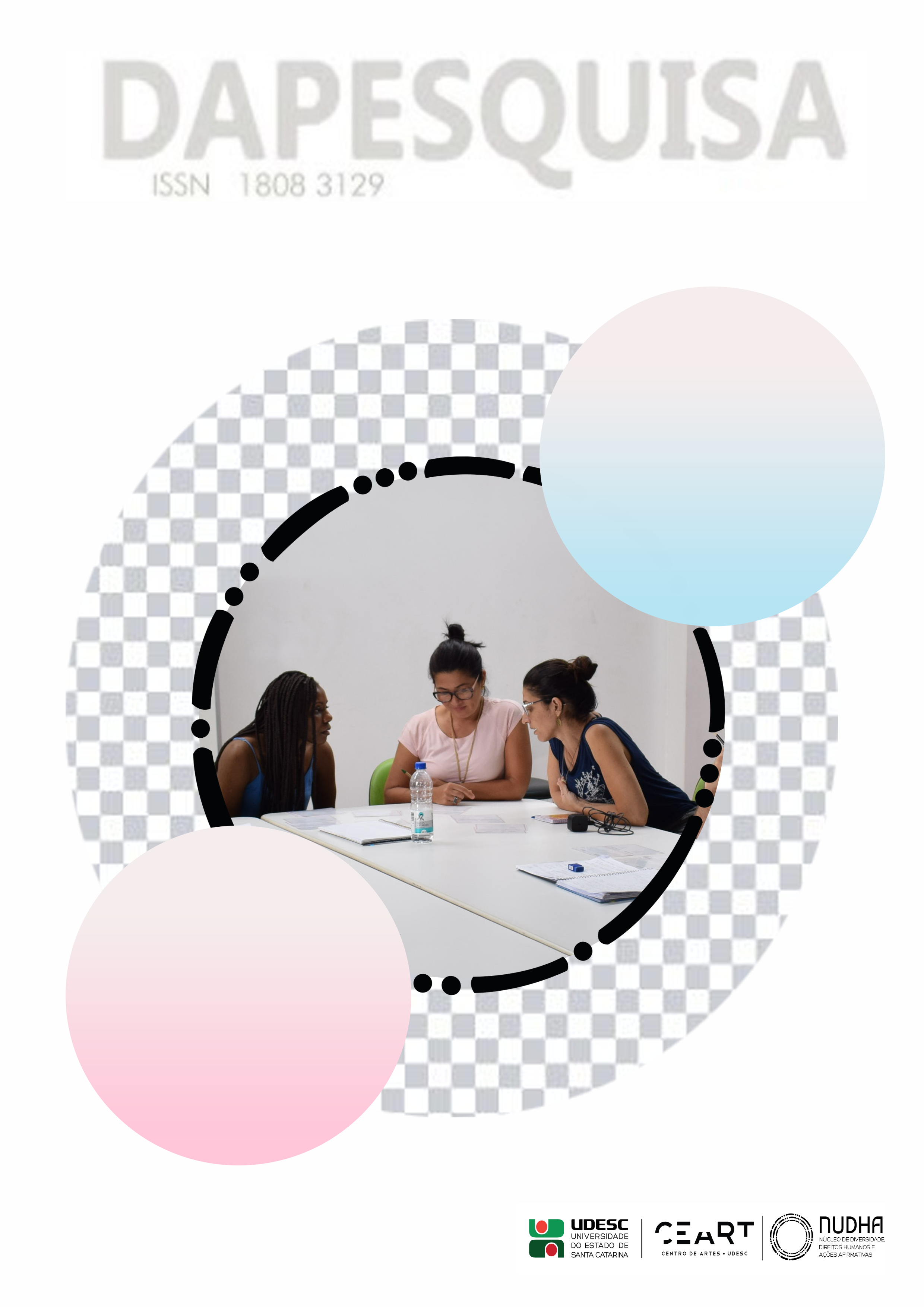Somos todas iguais ou somos todas diferentes?
Práticas cênicas estimulando o debate sobre a diferença no ambiente escolar
DOI:
https://doi.org/10.5965/1808312915252020e0034Palavras-chave:
Teatro na educação, Crianças com deficiência - Educação - Arte, Ambiente escolar, PreconceitosResumo
A sociedade contemporânea tem muitos padrões a serem seguidos: estéticos, formas de pensar e formas de agir. Pessoas que fogem de tais padrões, muitas vezes são vistas como desencaixadas (BERSELLI; ISAACSSON, 2018) e o ambiente escolar é um dos lugares que mais reforça padrões: estudantes enfileiradas, aprendendo os mesmos conteúdos, buscando as mesmas notas e não podendo dialogar. Práticas cênicas que vão contra o discurso dominante (FORTIN, 2011), são vistas aqui como possíveis potencializadoras de debates acerca das diferenças, promovendo uma revisão de entendimentos acerca da deficiência e eficiência ao colocarem a pessoa como centro das pesquisas a partir de experiências práticas. Com tamanha potencialidade, elas podem estar no ambiente escolar a partir dos anos iniciais, proporcionando práticas e experiências que evidenciem as singularidades de cada pessoa e o respeito por cada corpo.
Downloads
Referências
BERSELLI, M. Práticas e técnicas corporais promovendo a presença de artistas com deficiência na cena contemporânea. Revista GEARTE, Porto Alegre, RS, v. 4, n. 1, p. 54-66, jan./abr. 2017. Disponível em: https://seer.ufrgs.br/gearte/article/view/71266. Acesso em: 29 set. 2019. DOI: https://doi.org/10.22456/2357-9854.71266
BERSELLI, M.; ISAACSSON, M. A presença de pessoas com deficiência na cena contemporânea desestabilizando construções sociais a respeito do corpo. Repertório, Salvador, BA, ano 21, n. 30, p. 365-387, 2018. Disponível em: https://portalseer.ufba.br/index.php/revteatro/article/view/25319. Acesso em: 24 set. 2019.
FERREIRA, F. R. A produção de sentidos sobre a imagem do corpo. Interface: comunicação, saúde, educação, Botucatu, SP, v. 12, n. 26, p. 471-83, jul./set. 2008. Disponível em: http://www.scielo.br/scielo.php?script=sci_abstract&pid=S1414-32832008000300002 &lng =en&nrm=iso&tlng=pt. Acesso em: 23 dez. 2019. DOI: https://doi.org/10.1590/S1414-32832008000300002
FORTIN, S. Nem do Lado Direito, nem do Avesso: o artista e suas modalidades de experiências de si e do mundo. In: WOSNIAK, C.; MARINHO, N. (org.). O Avesso do Avesso do Corpo: Educação somática como práxis. Joinville: Nova Letra, 2011, p. 25-42.
FOUCAULT, M. Vigiar e punir: nascimento da prisão. 20. ed. Petrópolis: Editora Vozes, 1999.
MACHADO, M. M. Cacos de infância: teatro da solidão compartilhada. São Paulo: Annablume/FAPESP, 2004.
SKLIAR, C. A invenção e a exclusão da alteridade "deficiente" a partir dos significados da normalidade. Educação e Realidade, Porto Alegre, RS, v. 24, n. 2, p. 15-32, jul./dez. 1999. Disponível em: https://seer.ufrgs.br/educacaoerealidade/article/view/55373. Acesso em: 10 set. 2019.
Publicado
Como Citar
Edição
Seção
Licença
Copyright (c) 2021 Flavia Grützmacher dos Santos, Marcia Berselli

Este trabalho está licenciado sob uma licença Creative Commons Attribution 4.0 International License.
Autores que publicam nesta revista concordam com os seguintes termos:
Autores mantém os direitos autorais e concedem à revista o direito de primeira publicação, com o trabalho simultaneamente licenciado sob a Licença Creative Commons Atribuição 4.0 Internacional, a qual permite que outros distribuam, remixem, adaptem e criem a partir do seu trabalho, mesmo para fins comerciais, desde que lhe atribuam o devido crédito pela criação original, reconhecendo a autoria e publicação inicial nesta revista.
A DAPesquisa, segue as recomendações do movimento de Acesso Aberto, proporciona acesso público a todo seu conteúdo, a partir do princípio de que tornar gratuito o acesso a pesquisas gera um maior intercâmbio global de conhecimento.
Plágio, em todas as suas formas, constitui um comportamento antiético de publicação e é inaceitável. A revista DAPesquisa utiliza o software iThenticate de controle de similaridade.





